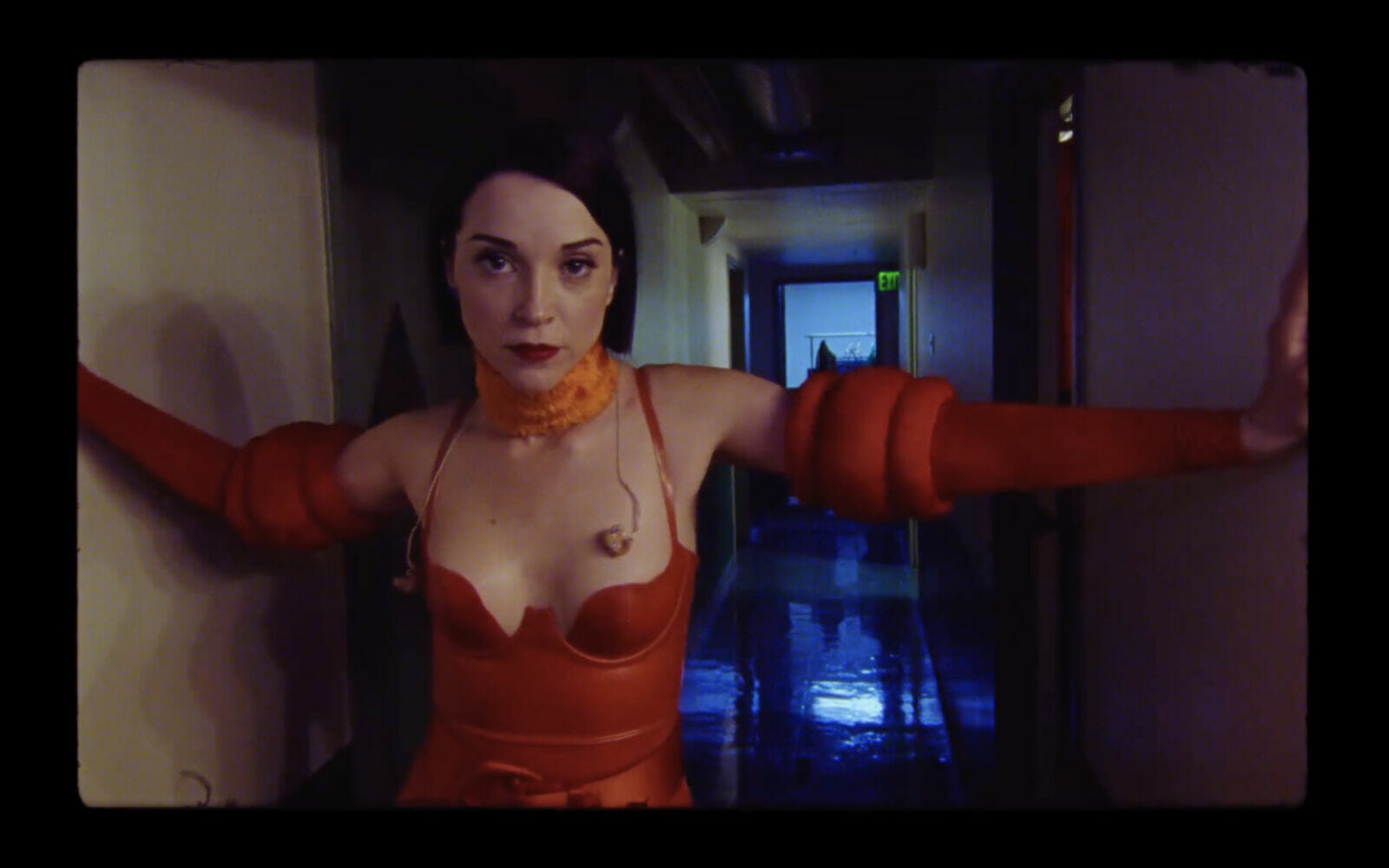“I’m not anything at all,” sings St. Vincent on the first song of her first album, sounding like she’s been emancipated. But she would go on to become many things. Reaching beyond her stage name, the artist otherwise known as Annie Clark adopted a different persona for each album: “Judy Garland on barbiturates” for her third, “near-future cult leader” for her fourth, “dominatrix at the mental institution” for her fifth. It was during her dominatrix phase that she wrote The Nowhere Inn, a movie about what it would be like to make a movie about St. Vincent. At the mental institution indeed.
Co-written by Carrie Brownstein—Sleater-Kinney frontwoman, half of the Portlandia duo, and longtime friend of Clark—the film takes place in a fictional reality where Brownstein is making a documentary about St. Vincent, hoping to show the world the person behind the persona. The Nowhere Inn could be called a metafictional mockumentary: an amalgam of This Is Spinal Tap’s satire, Portlandia’s absurdist humor, and the identity-bending, surrealist poetry of St. Vincent’s music. Viewed uncharitably, it sounds like an experimental vanity project. The first scene doesn’t deter that notion. Clark sits in the back of a limo, explaining who she is to her none-the-wiser driver, and it’s meant to be funny because of its infeasibility: who hasn’t heard of St. Vincent? She wrote a movie about herself and got it greenlit, after all.
READ ALSO: Harkins celebrates 88 years of movies with big weekend deals
Truth is, though, a lot of people haven’t heard of St. Vincent. She’s a celebrated musician, but hardly an international superstar. Give the movie a few more scenes and it’ll echo that acknowledgment: the idea that “the world wants to see the real Annie Clark” is practically played for laughs. The Nowhere Inn’s version of Clark (hereafter referred to as “Clarque” to distinguish the person from the character) knows that her “real” self is of no great interest, so she tries to spice up her friend’s documentary by slipping deeper into her St. Vincent persona. This drives a rift between her and Brownstein, who stops recognizing the friend she thought she knew.
What follows is a mind-melting journey down the rabbit hole. Writhing in its meta reveries, The Nowhere Inn doesn’t just blur the lines between Clarque and St. Vincent—it obscures the difference between Clarque and Clark, eyeing its subject’s involvement in its authorship and begging the question of how much we can trust it. Director Bill Benz and editor Ali Greer, both veterans of Portlandia, twist the movie into shapes that make trust a big ask. It’s a vortex of transfixing alienation. Some scenes are shot on film and then chemically altered, contorting Clark’s face into a screaming LSD hallucination. Incongruent shots are edited together to break narrative immersion; entire scenes operate on nothing but dream logic. The film’s visual landscape doesn’t let you take anything at face value.
Or at least its back half doesn’t. The Nowhere Inn’s first half is more forthright than the musical Inland Empire it spirals into. It gives us a baseline to descend into madness from, but it also gives us a “baseline Clarque”, if you will—a version of the character presented as Clark herself, unfictionalized and objective. As Clarque loses herself in the St. Vincent persona, alienating Brownstein in the process, the movie’s message seems transparent: fame and authenticity are opposite forces. The closer Clarque gets to St. Vincent, the further she falls from Clark and the less honest she is. It’s hardly a unique perspective on fame.
But the latter half folds all that into itself. As The Nowhere Inn burrows into self-awareness, it scrambles its chronology and becomes cognizant of Clark’s creative authority, recontextualizing the “baseline Clarque” at the film’s outset: that, too, was a persona, created by the person with the most stake in it. Clarque never was Clark. The more inscrutable The Nowhere Inn, the better it is. As it casts off its straightforward fame parable, it reveals itself as a trippy, discursive thesis on self-mythologization. Its initial unsophistication was feigned—but that still leaves the first half feeling, well, unsophisticated, if only in the moment.
When it’s all said and done, The Nowhere Inn makes good on the claim with which Clark started her career. To her audience, Clark isn’t anything at all—she’s St. Vincent, she’s “Clarque”, she’s a character. It’s easier to maintain that distance in music, when your fans have nothing to postulate on but your lyrics. But cinema is different. Fans sometimes feel like concert documentaries reveal who these musicians really are. The Nowhere Inn strikes back with a retort: if you believe an autobiography, you know its subject less than you ever did before.
★★★½ (3.5/5)




